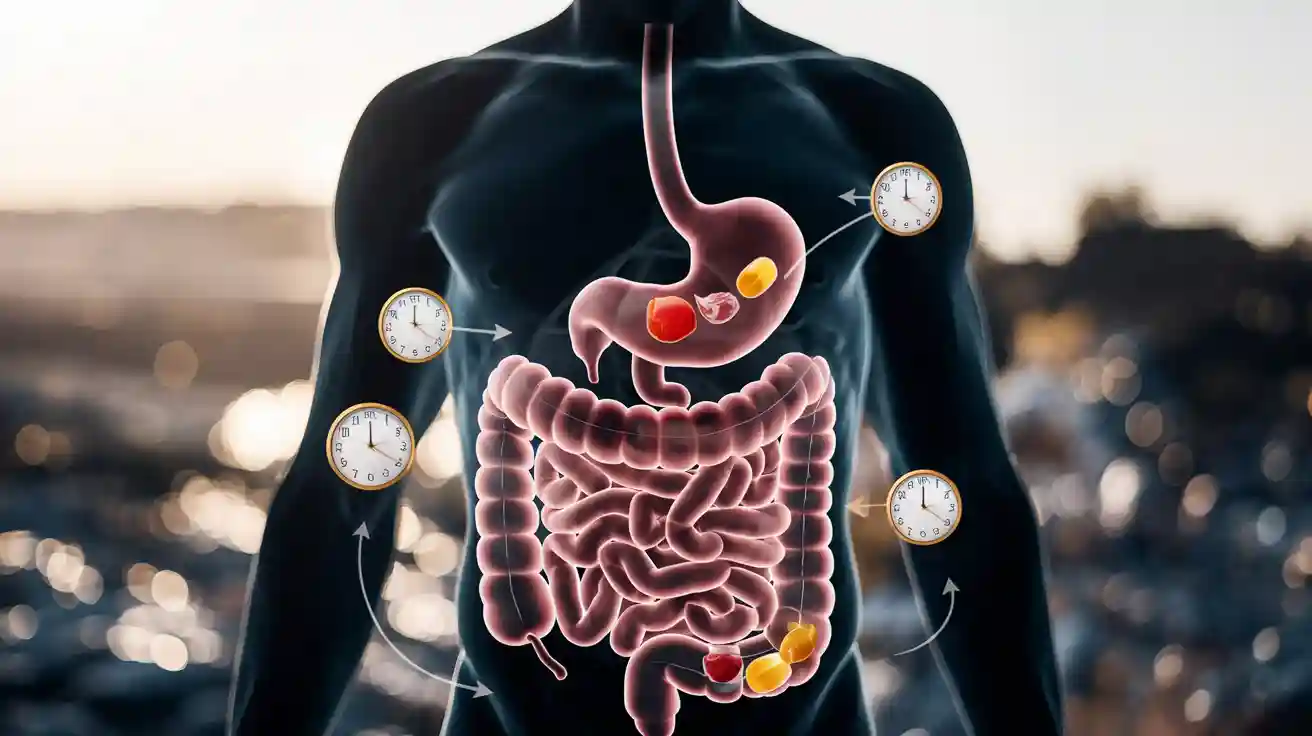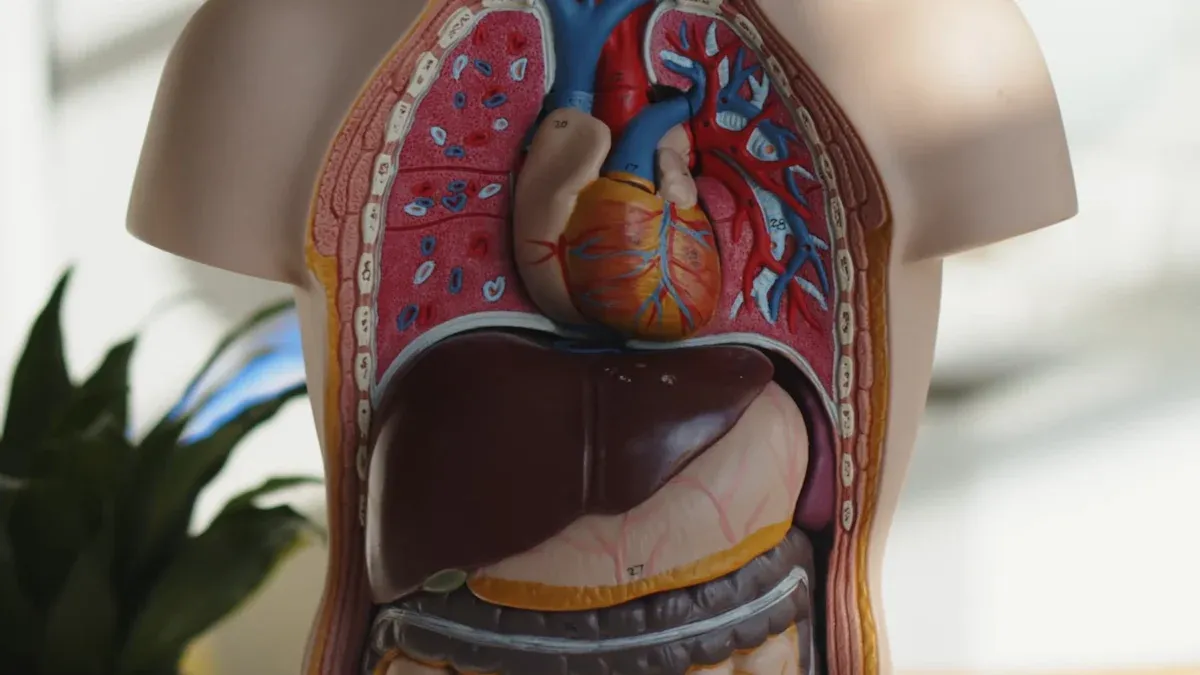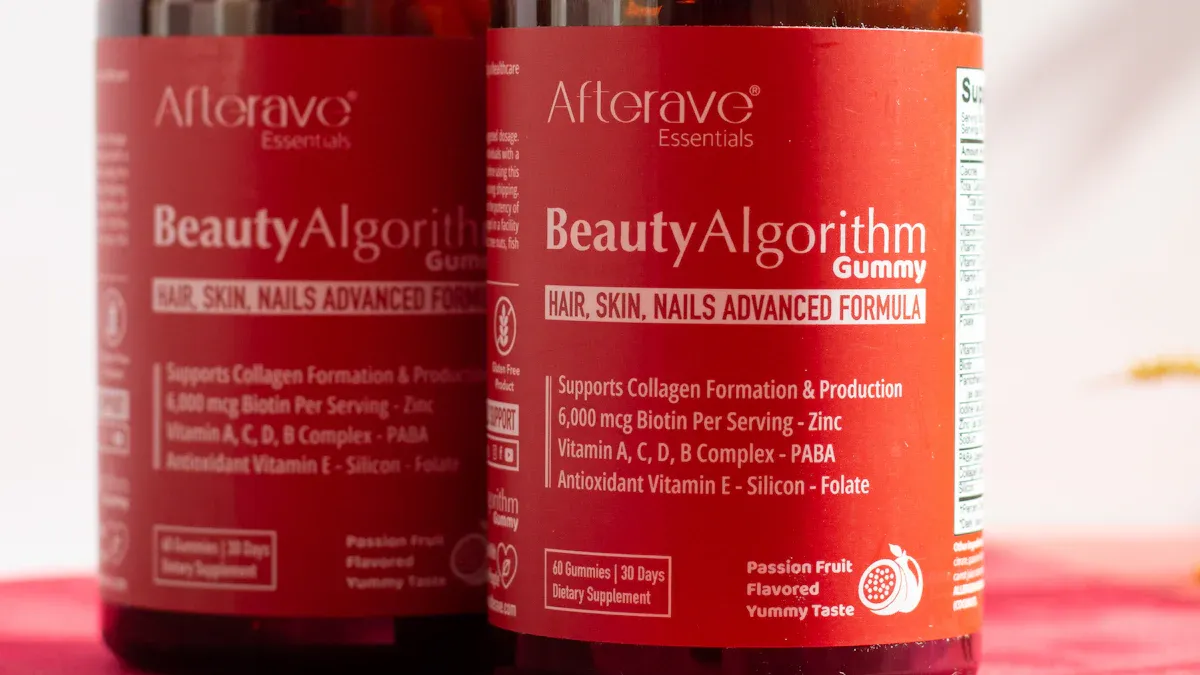Understanding the Digestive Timeline How Vitamins Are Absorbed
Table of Contents

You might wonder how long does it take vitamins to work after you take them. Most vitamins start getting absorbed in your digestive system within minutes to a few hours. Understanding the digestive timeline matters because your body absorbs and uses nutrients based on several things:
- The digestive timeline affects how well your body uses vitamins.
- Digestive health, vitamin type, and nutrient interactions change absorption rates.
- Knowing these details helps you get the most from supplements and avoid vitamin deficiencies.
Digestive Timeline for Vitamins

How Long Does It Take for Vitamins to Work
When you take a multivitamin or any vitamin supplements, you might ask, “how long does it take for vitamins to work?” The answer depends on the digestive timeline and the type of vitamins you consume. Your digestive system starts breaking down nutrients as soon as you swallow them. The digestive process begins in your stomach, where acids and enzymes help release vitamins from food or supplements. Most absorption happens in your small intestine, which is the main site for nutrients to enter your bloodstream.
Water-soluble vitamins, such as b vitamins and vitamin C, move quickly through your digestive system. You can take these at any time, but experts recommend taking b vitamins in the morning to support energy production. Fat-soluble vitamins, like vitamins A, D, E, and K, need fat in your meal for proper absorption. If you take a daily multivitamin, you should pair it with food that contains some fat to boost effectiveness.
Here is a table showing the recommended absorption times for different vitamin types:
| Vitamin Type | Absorption Time/Recommendation |
|---|---|
| Water-soluble | Can be taken at any time; recommended to take B vitamins in the morning for energy production. |
| Fat-soluble | Should be taken with a meal that contains fat for proper absorption. |
The whole gut transit time, which is the time it takes for food to move through your digestive tract, usually ranges from 24 to 72 hours. However, the small intestinal transit time, where most vitamin absorption occurs, is much shorter—often just a few hours. Scientific studies show that vitamins become bioavailable in your bloodstream within minutes to hours after ingestion. For example, cereal fortified with vitamin E gets absorbed faster than vitamin E pills taken alone. The method of intake can change how quickly and effectively vitamins work in your body.
Your digestive system also redistributes vitamins to organs and tissues. The concentration of vitamins in your blood plasma depends on how your liver and kidneys process them. This affects how long vitamins stay active and how do vitamins work to support your health.
Factors Affecting Absorption
You might notice that sometimes your body absorbs vitamins better than other times. Many factors influence absorption and the digestive timeline. The type of vitamin, your digestive health, age, genetics, and even medications play a role.
Digestive Health and Conditions
Your digestive process can change if you have certain health conditions. For example, Crohn’s disease and irritable bowel syndrome (IBS) disrupt absorption, leading to deficiencies in nutrients like iron, vitamin B12, vitamin D, and calcium. Celiac disease causes malabsorption of vitamin D and other nutrients due to damage in the small intestine. In long-standing celiac disease, low bone mineral density often results from poor calcium and vitamin D absorption.
In patients with long-standing celiac disease, low bone mineral density is frequently observed due to the combined effects of calcium and vitamin D malabsorption, leading to secondary hyperparathyroidism and increased bone turnover.
Here is a table showing how digestive health conditions affect the absorption timeline:
| Condition | Impact on Absorption Timeline |
|---|---|
| General Digestive Health | Varies based on metabolic rates and digestive efficiency |
| Crohn’s Disease | Leads to deficiencies in multiple nutrients due to inflammation and ulceration |
| Irritable Bowel Syndrome (IBS) | Disrupts absorption, resulting in lower levels of certain vitamins and minerals |
Food and Meal Composition
The presence of food in your stomach changes how well your body absorbs vitamins. Fat-soluble vitamins need fat for optimal absorption. Studies show that even 3 grams of fat per meal can help your body absorb pro-vitamin A carotenoids. If you eat too little fat, you may not get the full benefit from your multivitamin.
| Study | Findings |
|---|---|
| Roodenburg et al. (2000) | 3 g of fat per meal is sufficient for optimal absorption of pro-vitamin A carotenoids. |
| Brown et al. (2004) | 29.5 g of fat per meal is insufficient for optimal absorption of fat-soluble vitamins. |
Age and Medications
As you age, your digestive system changes. Older adults often produce less stomach acid, which can slow vitamin absorption. Conditions like atrophic gastritis, common in older adults, can cause vitamin B12 deficiency. Medications such as proton pump inhibitors and ibuprofen can further reduce absorption and bioavailability of essential vitamins.
- Aging decreases stomach acid production, affecting vitamin absorption.
- Digestive disorders become more common with age, impacting nutrient absorption.
- Medications like proton pump inhibitors can reduce the bioavailability of vitamins like folic acid, iron, and vitamin B12.
Genetics and Individual Differences
Genetic variations also affect how your body absorbs and uses vitamins. For example, changes in the MTHFR gene can impact folate absorption, while TCN2 gene variations affect vitamin B12 absorption. Some people have single-nucleotide polymorphisms (SNPs) that impair the metabolism of vitamins D, E, C, B9, and B12.
- Variants in the GC gene link to lower vitamin D levels.
- Genetic factors can change homocysteine metabolism and levels of B vitamins, vitamin D, and vitamin E.
Nutrition and Supplement Effectiveness
Your overall nutrition and the way you take supplements matter. If you take vitamin supplements with the right foods, you increase their effectiveness. If you have digestive disorders or take certain medications, you may need to adjust your supplement routine to ensure proper absorption.
The digestive timeline for vitamins depends on many factors. You can improve vitamin absorption by understanding your digestive system, choosing the right supplements, and pairing them with appropriate foods. This helps you get the most out of your daily multivitamin and supports your overall health.
How Are Vitamins Absorbed

When you ask, “how are vitamins absorbed,” you need to look at the journey each vitamin takes through your digestive system. The process depends on whether the vitamin is water-soluble or fat-soluble. Both types travel through your small intestine, but they use different pathways and helpers along the way.
Water-Soluble Vitamins
Water-soluble vitamins include vitamin C and the b vitamins. Your body absorbs these vitamins mainly in the small intestine. After you eat, gastric emptying moves food from your stomach into the small intestine. Here, water-soluble vitamins dissolve in water and pass directly into your bloodstream. This process happens quickly, often within a few hours, because these vitamins do not need special carriers.
Most water-soluble vitamins use passive diffusion or active transport to cross the lining of the small intestine. Vitamin B12 is an exception. It needs a helper called intrinsic factor, which binds to B12 and allows it to be absorbed in the last part of the small intestine, called the terminal ileum.
Note: Some water-soluble vitamins, like biotin and folic acid, can also come from bacteria in your large intestine. However, the small intestine remains the main site for vitamin absorption.
Once in your bloodstream, your body uses these vitamins right away. Any extra leaves your body through urine. This means you need to get water-soluble vitamins from your diet every day, since your body does not store them.
| Characteristic | Water-Soluble Vitamins |
|---|---|
| Absorption | Directly into the bloodstream with water |
| Storage | Not stored; excess excreted in urine |
| Main Site | Small intestine (some in large intestine) |
| Example | Vitamin C, b vitamins |
Fat-Soluble Vitamins
Fat-soluble vitamins include vitamins A, D, E, and K. Your body absorbs these vitamins differently. First, you need to eat some dietary fat with your meal. When fat enters your small intestine, your liver releases bile acids. These bile acids break down fat into tiny droplets called micelles. Fat-soluble vitamins dissolve in these micelles.
Your small intestine absorbs the micelles through its lining. The vitamins then get packaged into chylomicrons, which are tiny fat transporters. These chylomicrons enter the lymphatic system, not the bloodstream right away. The lymphatic system acts like a highway for large fat particles and fat-soluble vitamins. Eventually, the lymphatic system empties into your bloodstream, allowing these vitamins to travel throughout your body.
Tip: Always take fat-soluble vitamins with a meal that contains healthy fats. This helps your body absorb them better and increases their bioavailability.
Fat-soluble vitamins can be stored in your liver, muscles, and fatty tissues. Your body can use these stores when you do not get enough from your diet. This storage makes it easier to maintain steady levels, but it also means you need to be careful not to take too much.
| Vitamin Type | Absorption Mechanism |
|---|---|
| Fat-Soluble | Incorporated into micelles with bile salts, then packaged into chylomicrons. |
| Water-Soluble | Absorbed directly into the bloodstream via passive diffusion or active transport. |
| Characteristic | Fat-Soluble Vitamins |
|---|---|
| Absorption | With dietary fat, via micelles and chylomicrons |
| Storage | Stored in liver, fatty tissue, muscles |
| Main Site | Small intestine |
| Example | Vitamins A, D, E, K |
Did you know? The lymphatic system absorbs fats and fat-soluble vitamins because they are too large to enter the bloodstream directly from the small intestine. This system uses special vessels called lacteals to carry these nutrients.
Comparing Absorption Pathways
You can see that water-soluble and fat-soluble vitamins follow different routes:
- Water-soluble vitamins move straight from the small intestine into your blood.
- Fat-soluble vitamins need bile acids and dietary fat to form micelles. These vitamins travel through the lymphatic system before reaching your blood.
The small intestinal transit time, which is the time nutrients spend in the small intestine, plays a key role in how quickly your body absorbs vitamins. The whole gut transit time, which covers the entire digestive tract, affects how long vitamins stay available for absorption.
Understanding these pathways helps you make smart choices about your diet and supplements. You can improve vitamin absorption by eating balanced meals and paying attention to how your body digests food.
Optimizing Vitamin Absorption
Best Practices
You can make your vitamin routine more effective by following a few simple steps. The digestive process works best when you pay attention to timing, food pairing, and supplement choices. Take your multivitamin with food to help your digestive system absorb nutrients and reduce stomach upset. Pair fat-soluble vitamins with healthy fats, such as avocado or olive oil, to boost absorption. If you eat carrots or tomatoes, add a little cold-pressed oil to unlock more nutrients. Cooking vegetables like tomatoes increases the amount of lycopene your body can use.
Try to combine vitamin C-rich foods, like oranges or strawberries, with iron-rich foods. This helps your digestive system absorb iron better. Steaming vegetables keeps more water-soluble vitamins, such as B and C, compared to boiling. Space out mineral supplements, like calcium and magnesium, during the day. This prevents competition for absorption and supports a more effective vitamin regimen.
| Vitamin Type | Absorption Influence | Meal Composition Impact |
|---|---|---|
| Fat-Soluble Vitamins | Better absorbed with dietary fat | Higher absorption with high-fat meals |
| Water-Soluble Vitamins | Size and division of doses matter | Divided doses absorbed more efficiently |
Tip: Probiotics can improve digestive health and increase absorption of B vitamins by up to 71%. Take B vitamins with probiotics for better results.
Recent research shows that new supplement forms, like sublingual drops and microencapsulation, can help your digestive system absorb vitamins faster. These methods bypass gastric emptying and improve the effectiveness of vitamin supplements.
Common Mistakes
Many people make mistakes that lower the effectiveness of their daily multivitamin. If you take fat-soluble vitamins without food, your digestive process cannot absorb them well. Taking iron on an empty stomach may cause nausea, but it helps absorption. Avoid taking calcium and iron together, since they compete for absorption in your digestive system. Grapefruit juice can interfere with some supplements and medications.
Some vitamins, like vitamin C and B12, should be taken at least two hours apart. Too much vitamin E can reduce the effectiveness of vitamin K. If you take all your supplements at once, your digestive timeline may not allow for proper absorption of each nutrient. Spread out your multivitamin and other supplements for better results.
| Mistake | Explanation |
|---|---|
| Timing | Taking iron on an empty stomach helps absorption but may cause nausea. |
| Food Pairing | Pairing iron with vitamin C-rich foods boosts absorption. |
| Interactions with Medications | Some vitamins and minerals interact with medications, lowering effectiveness. |
| Fat-Soluble vs Water-Soluble | Fat-soluble vitamins need fat; water-soluble vitamins need frequent intake. |
| Separating Competing Nutrients | Take calcium and iron at different times to avoid competition. |
| Grapefruit Juice Interference | Grapefruit juice can block absorption of some supplements. |
Note: The digestive timeline and digestive health play a big role in how do vitamins work. You can improve digestive health and nutrition by following these tips and avoiding common mistakes. This supports better absorption and helps your digestive system get the most from your daily multivitamin.
You learned that vitamins travel through your small intestine, where folds and villi help absorb nutrients quickly. Water-soluble vitamins enter your bloodstream, while fat-soluble vitamins use lymphatic vessels. A healthy gut supports vitamin efficacy and helps you build an effective vitamin regimen. The table below shows how smart strategies improve the effects of supplements:
| Strategy | Impact on Health Outcomes |
|---|---|
| Choosing micronutrient-rich foods | Better nutrient availability |
| Using dietary enhancers | Improved absorption |
| Caring for gut health | Stronger nutrient utilization |
You should talk to a healthcare professional for advice about vitamin supplements and safe usage.
FAQ
How soon will I feel the effects of vitamins after taking them?
You may notice effects from vitamins within a few hours to a few days. Your body absorbs most nutrients quickly, but some benefits, like improved energy, may take longer to appear.
Should you take supplements with food or on an empty stomach?
You should take most supplements with food. This helps your body absorb nutrients better. Fat-soluble vitamins need dietary fat for proper absorption. Water-soluble vitamins work best when taken with meals.
Can you take all your vitamins at once?
You should not take all your vitamins at once. Some nutrients compete for absorption. Space out your supplements during the day to help your body use each nutrient more effectively.
What foods help your body absorb vitamins better?
Healthy fats, like avocado or olive oil, help your body absorb fat-soluble vitamins. Pair vitamin C-rich foods with iron-rich foods to boost iron absorption. Eating a balanced meal supports nutrient uptake.
Do age and health conditions affect vitamin absorption?
Age and certain health conditions can change how your body absorbs vitamins. Older adults and people with digestive issues may need special supplements or advice from a healthcare provider.

Poseidon
Master of Nutritional Epidemiology, University of Copenhagen, Herbal Functional Nutrition Researcher
Focus: The scientific application of natural active ingredients such as Tongo Ali, Horny Goat Weed, and Maca to sexual health and metabolic regulation.
Core Focus:
Men: Use a combination of Tongo Ali (an energizing factor) + Maca (an energy reserve) to improve low energy and fluctuating libido.
Women: Use a combination of Horny Goat Weed (a gentle regulator) + Maca (a nutritional synergist) to alleviate low libido and hormonal imbalances.
Stressed/Middle-Aged Adults: This triple-ingredient synergy supports metabolism, physical strength, and intimacy.
Product Concept:
Based on traditional applications and modern research (e.g., Tongo Ali promotes testosterone-enhancing enzyme activity, and icariin provides gentle regulation), we preserve core active ingredients and eschew conceptual packaging—using natural ingredients to address specific needs.
Simply put: I'm a nutritionist who understands "herbal actives." I use scientifically proven ingredients like Tongo Ali, Epimedium, and Maca to help you make "sexual health" and "nutritional support" a daily routine.
